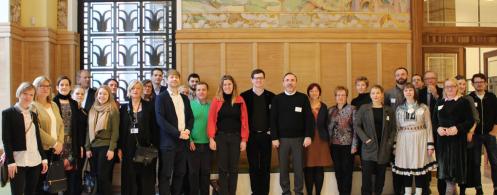
On the 3rd of February, the House of European History participated in Bozar’s programme “1918, European Dreams of Modernity - 100 years on” with a series of guided visits in the museum, under the name of Daydreaming Nations Tours.
The event touched upon the significance of the year 1918, from a transnational perspective, and how this period is still inspiring us 100 years later. Thirteen writers, journalists, artists and historians from eight different countries shared their own interpretations of this key period of political and social transformation in Europe, and discussed its significance today, together with visitors of the House of European History. The speakers, selected by cultural institutes in Brussels, arrived in the morning at the House of European History as visitors themselves, and after exploring the museum, they had to “change hats” and to become “guides for a day” in an exhibition that they had never seen before!
The Daydreaming Nations tours attracted around 300 visitors from more than 10 countries, who had the unique opportunity to discover the museum through singular people bringing their own vision on how to tell Europe’s history. The guides took various standpoints for their visit, comparing and contrasting the House of European History’s narrative with personal stories and national perspectives and starting off open discussions with the visitors attending their tour.
Talking about this experience, Lithuanian artist and philosopher Arūnas Gelūnas, mentioned that guiding a group of visitors in the museum was actually a “crazy thing”, but at the same time “a very positive experience” in a museum that is also a “very educational and stimulating project, and which is by no means a finished entity”.
For David Zábranský, a Czech writer and lawyer, “it was not so important to speak about European History as much as to speak about the current situation in Europe”. David chose an unexpected approach to his guided tour, by engaging the visitors in an open debate and discussion.
For Adrian Cioroianu, a Romanian historian and professor, the museum was an actual surprise and a wonderful idea. As far as the year 1918 was concerned, the Romanian professor argued that it represented the year when his country won the war, but as he argued, “after a war, all the countries involved are losers”.
Pirita Näkkäläjärvi, a strategy consultant and Sami of the year in 2017, took the opportunity of her visit in the museum, to address the topic of the Sami people and raise awareness about her community, which is partitioned into four countries: Finland, Sweden, Norway and Russia. “So in that sense we are quite a European people, that we don’t care so much about borders and try to ignore them as much as we can, although they do bring us obstacles but we want to think ourselves as one people in four countries.”
We would like to thank Grzegorz Jankowicz, Voldemārs Johansons, Peeter Helme, Valda Selga Liepiņa, Heidemarie Uhl, Pavlína Kvapilová, Arūnas Gelūnas, David Zábranský, Krzysztof Zanussi, Virva Liski, Ion M. Ionita, Pirita Näkkäläjärvi, Adrian Cioroianu, and all the cultural institutes, for their wonderful participation in the Daydreaming Nations tours!